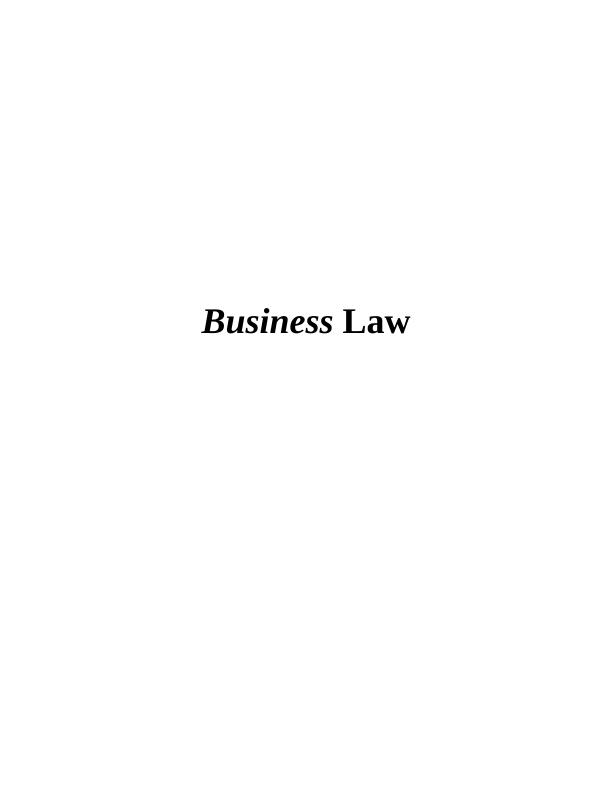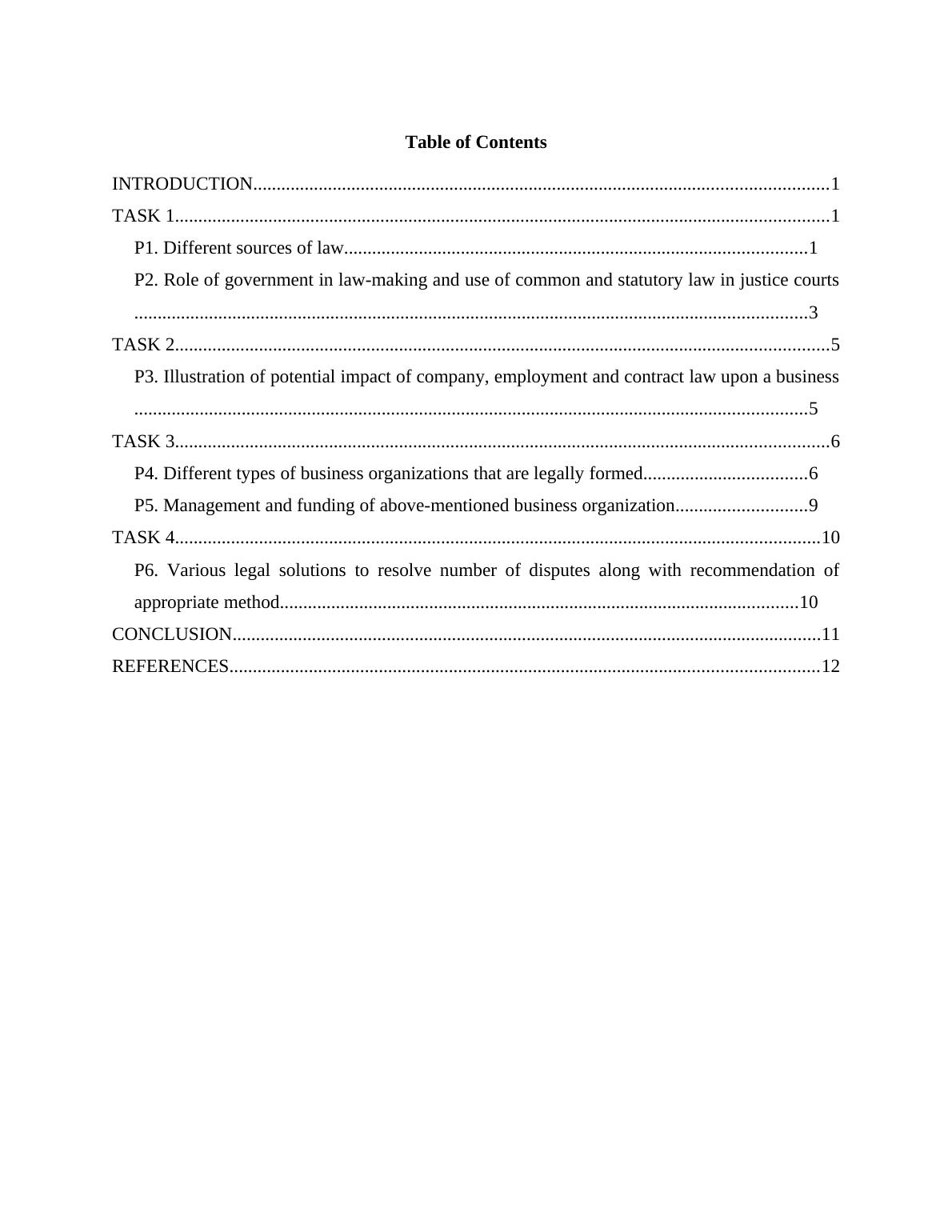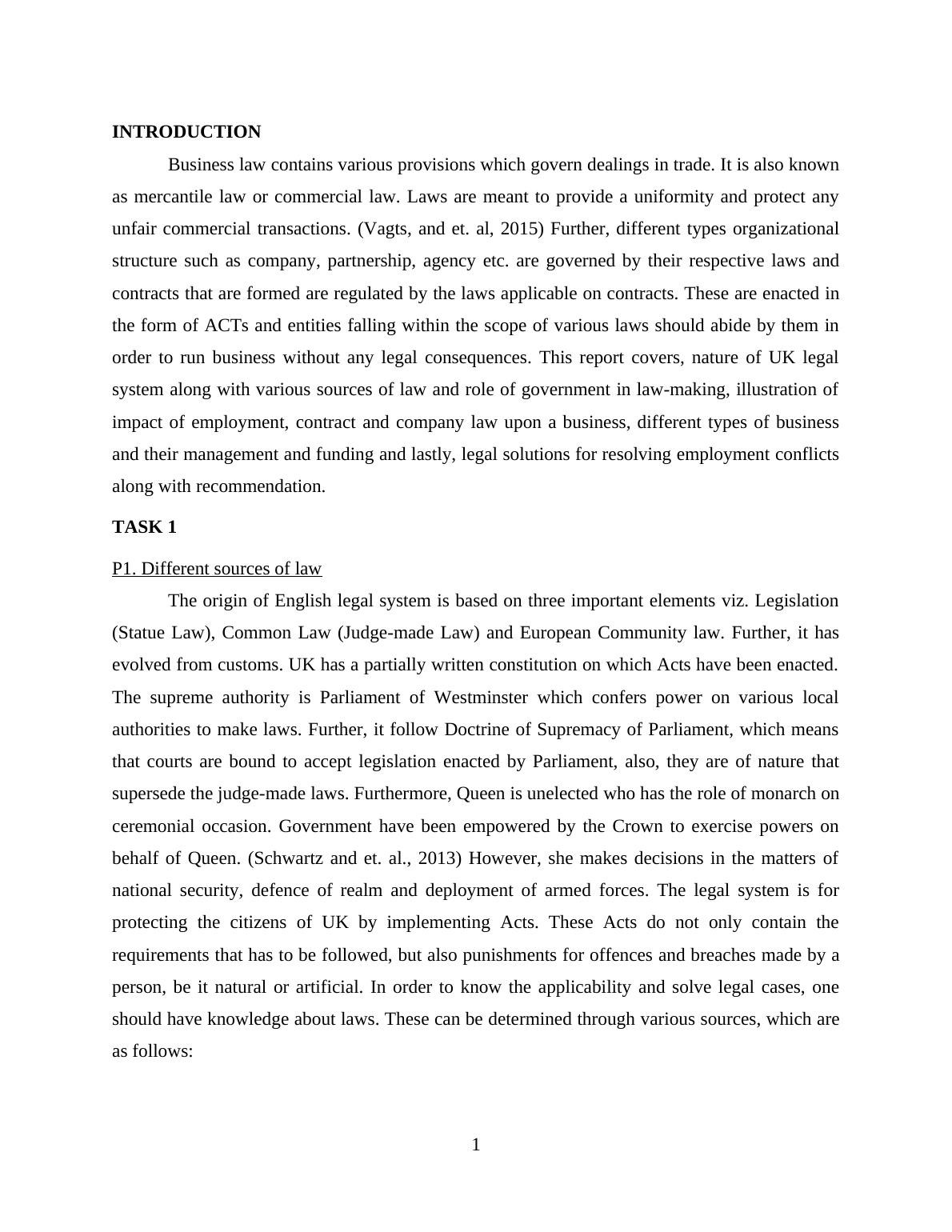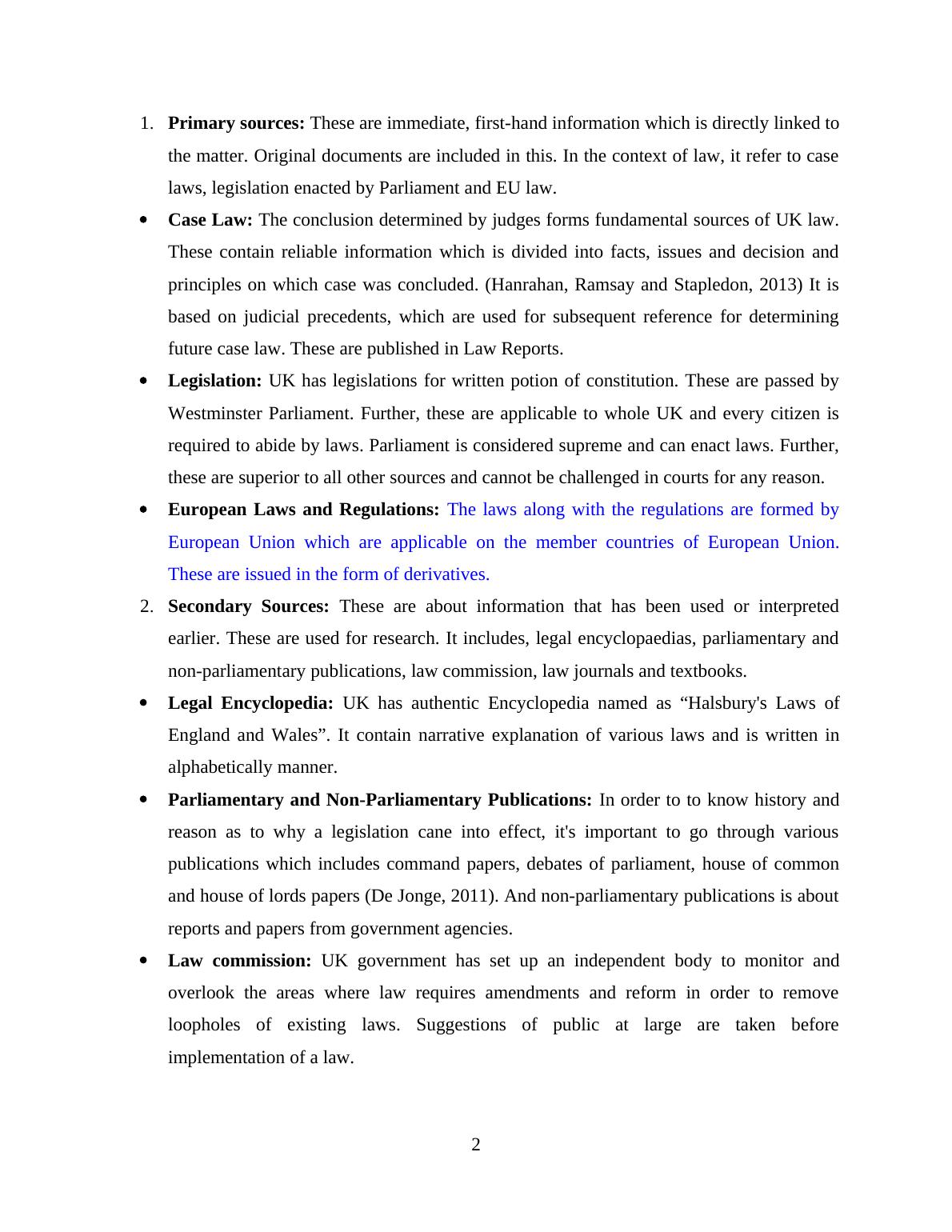Law-making in business organizations
Added on 2020-10-22
15 Pages4955 Words441 Views
Business Law

Table of ContentsINTRODUCTION...........................................................................................................................1TASK 1............................................................................................................................................1P1. Different sources of law...................................................................................................1P2. Role of government in law-making and use of common and statutory law in justice courts................................................................................................................................................3TASK 2............................................................................................................................................5P3. Illustration of potential impact of company, employment and contract law upon a business................................................................................................................................................5TASK 3............................................................................................................................................6P4. Different types of business organizations that are legally formed...................................6P5. Management and funding of above-mentioned business organization............................9TASK 4..........................................................................................................................................10P6. Various legal solutions to resolve number of disputes along with recommendation ofappropriate method...............................................................................................................10CONCLUSION..............................................................................................................................11REFERENCES..............................................................................................................................12

INTRODUCTIONBusiness law contains various provisions which govern dealings in trade. It is also knownas mercantile law or commercial law. Laws are meant to provide a uniformity and protect anyunfair commercial transactions. (Vagts, and et. al, 2015) Further, different types organizationalstructure such as company, partnership, agency etc. are governed by their respective laws andcontracts that are formed are regulated by the laws applicable on contracts. These are enacted inthe form of ACTs and entities falling within the scope of various laws should abide by them inorder to run business without any legal consequences. This report covers, nature of UK legalsystem along with various sources of law and role of government in law-making, illustration ofimpact of employment, contract and company law upon a business, different types of businessand their management and funding and lastly, legal solutions for resolving employment conflictsalong with recommendation. TASK 1P1. Different sources of lawThe origin of English legal system is based on three important elements viz. Legislation(Statue Law), Common Law (Judge-made Law) and European Community law. Further, it hasevolved from customs. UK has a partially written constitution on which Acts have been enacted.The supreme authority is Parliament of Westminster which confers power on various localauthorities to make laws. Further, it follow Doctrine of Supremacy of Parliament, which meansthat courts are bound to accept legislation enacted by Parliament, also, they are of nature thatsupersede the judge-made laws. Furthermore, Queen is unelected who has the role of monarch onceremonial occasion. Government have been empowered by the Crown to exercise powers onbehalf of Queen. (Schwartz and et. al., 2013) However, she makes decisions in the matters ofnational security, defence of realm and deployment of armed forces. The legal system is forprotecting the citizens of UK by implementing Acts. These Acts do not only contain therequirements that has to be followed, but also punishments for offences and breaches made by aperson, be it natural or artificial. In order to know the applicability and solve legal cases, oneshould have knowledge about laws. These can be determined through various sources, which areas follows: 1

1.Primary sources: These are immediate, first-hand information which is directly linked tothe matter. Original documents are included in this. In the context of law, it refer to caselaws, legislation enacted by Parliament and EU law. Case Law: The conclusion determined by judges forms fundamental sources of UK law.These contain reliable information which is divided into facts, issues and decision andprinciples on which case was concluded. (Hanrahan, Ramsay and Stapledon, 2013) It isbased on judicial precedents, which are used for subsequent reference for determiningfuture case law. These are published in Law Reports. Legislation: UK has legislations for written potion of constitution. These are passed byWestminster Parliament. Further, these are applicable to whole UK and every citizen isrequired to abide by laws. Parliament is considered supreme and can enact laws. Further,these are superior to all other sources and cannot be challenged in courts for any reason. European Laws and Regulations: The laws along with the regulations are formed byEuropean Union which are applicable on the member countries of European Union.These are issued in the form of derivatives. 2.Secondary Sources: These are about information that has been used or interpretedearlier. These are used for research. It includes, legal encyclopaedias, parliamentary andnon-parliamentary publications, law commission, law journals and textbooks. Legal Encyclopedia: UK has authentic Encyclopedia named as “Halsbury's Laws ofEngland and Wales”. It contain narrative explanation of various laws and is written inalphabetically manner. Parliamentary and Non-Parliamentary Publications: In order to to know history andreason as to why a legislation cane into effect, it's important to go through variouspublications which includes command papers, debates of parliament, house of commonand house of lords papers (De Jonge, 2011). And non-parliamentary publications is aboutreports and papers from government agencies. Law commission: UK government has set up an independent body to monitor andoverlook the areas where law requires amendments and reform in order to removeloopholes of existing laws. Suggestions of public at large are taken beforeimplementation of a law. 2

End of preview
Want to access all the pages? Upload your documents or become a member.
Related Documents
Business Law INTRODUCTION 3 TASK 1 3 P1. Different Sources of UK law 3 P2, Government and the Role of Law in Law-Makinglg...
|11
|3887
|385
Introduction To Business Law (docs)lg...
|13
|3146
|249
Business Law INTRODUCTION 1 TASK 11 P1. Different sources of law1 P2. Roles of government in law making and application 3 TASK 23 P4. Different types of business lawlg...
|12
|4094
|414
Business Law Assignment Solved - P1 Different sources of lawlg...
|12
|4055
|124
Unit 7- Business Lawlg...
|12
|4385
|60
Business Law Aspects - Assignmentlg...
|13
|3858
|217
